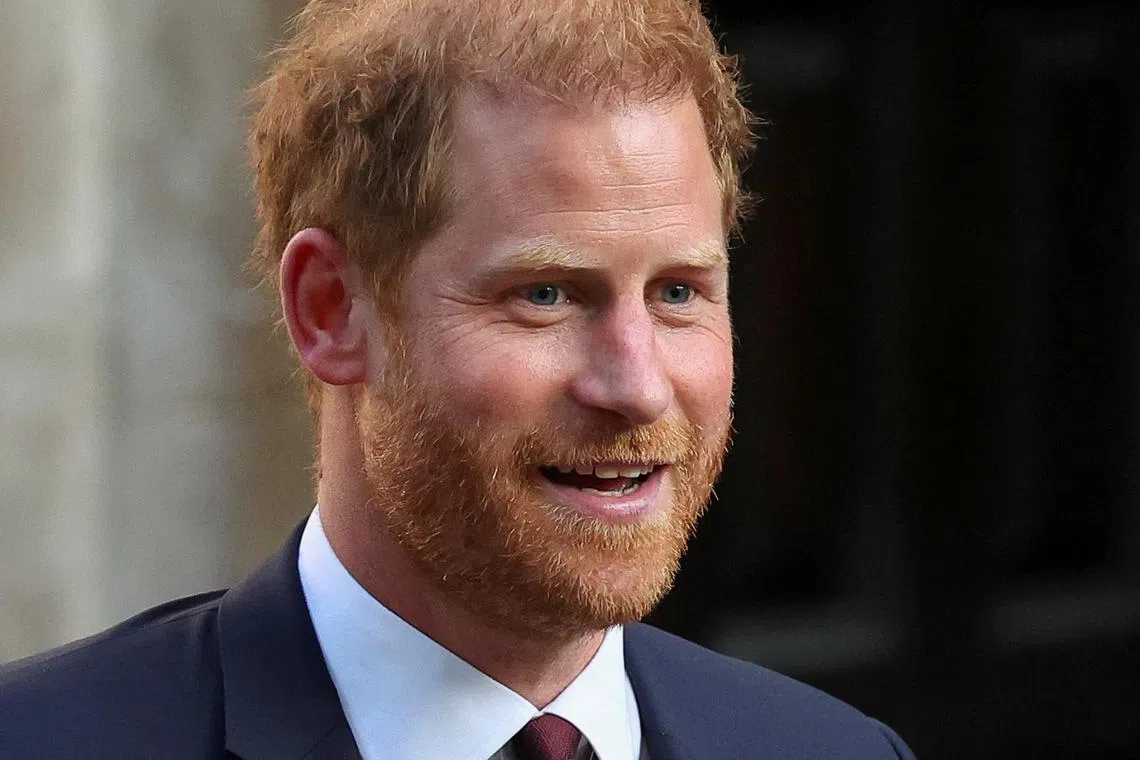Prince Harry says struggle with British tabloids deepened family rift
Sign up now: Get ST's newsletters delivered to your inbox

Britain's Prince Harry did not explain exactly how his legal battle had further ruptured relations with his father, King Charles III, or brother, Prince William.
PHOTO: REUTERS
LONDON – Prince Harry’s marathon quest against Britain’s tabloids produced a “monumental victory” in the courts, he said in a television interview that aired on July 25, but it was a “central piece” of the bitter rift between him and other members of the British royal family.
Speaking for the first time since winning hundreds of thousands of pounds in damages from Mirror Group Newspapers
“I’ve made it very clear that this is something that needs to be done,” he said in excerpts released by ITV News, part of an hour-long documentary about the phone-hacking scandal. But he added: “It would be nice if we, you know, did it as a family.”
Harry, the younger son of King Charles III, did not explain exactly how his legal battle had further ruptured relations with his father or brother, Prince William. In his memoir, Spare (2023), he attributed the rift to multiple causes, including his family’s treatment of his wife Meghan Markle, a biracial American former actress.
But Harry’s determination to sue the tabloids put the royal family in an awkward position. In his lawsuit against Mr Rupert Murdoch’s News Group Newspapers, Harry disclosed that William had settled claims that the publisher hacked his cellphone for a “huge sum of money”.
The settlement, Harry said, grew out of a “secret agreement” under which the family deferred legal claims against the publisher to avoid having to testify about embarrassing details from their intercepted voicemail.
Asked by ITV interviewer Rebecca Barry whether his decision to go ahead with litigation contributed to the breakdown, Harry said that was “a central piece to it”. He added: “It’s a hard question to answer because anything I say about my family results in a torrent of abuse from the press.”
“I believe that, again, from a service standpoint and when you are in a public role, these are the things we should be doing for the greater good,” Harry said. “But, you know, I’m doing this for my reasons.”
When Barry asked how his family’s decision to handle disputes with the tabloids privately had played out, he left little doubt of his views, even as he conceded the personal price of his more public approach.
“I think everything that’s played out has shown people what the truth of the matter is,” said Harry, looking grave but composed.
“For me, the mission continues,” he added, while acknowledging, “It’s caused, as you say, part of the rift.”
Harry also addressed claims that his late mother Diana, Princess of Wales, had been driven to paranoia by the relentless intrusion of the tabloid press. She was killed in a car crash in Paris in 1997 after a high-speed pursuit by photographers.
“Still today,” Harry said, “the tabloid press very much enjoy painting her as being paranoid.”
“But she wasn’t paranoid. She was absolutely right of what was happening to her,” he added. “And she’s not around today to find out the truth.”
In 2021, after the BBC issued a belated apology for a sensational 1995 interview with Diana that had been arranged under deceitful terms, William accused BBC employees of making “lurid and false claims about the royal family, which played on her fears and fuelled paranoia.”
More than two decades after the explosive revelations that the tabloids routinely hacked the cellphones of celebrities and other public figures, Harry has become one of the last people still fighting the publishers in court.
He and other plaintiffs recently lost an effort to draw Mr Murdoch, 93, into a hacking lawsuit against his company, News Group Newspapers. Judge Timothy Fancourt observed that he understood the plaintiffs wanted “to shoot at ‘trophy’ targets”, but concluded that Mr Murdoch was not relevant to their claims.
The judge noted, however, that the trial was already set to air allegations of a cover-up by Mr Murdoch’s “trusted lieutenants”, including his son James; Ms Rebekah Brooks, chief executive of News UK; and Mr Will Lewis, a former News executive who is now the publisher of The Washington Post. All three have denied the allegations.
In the case against Mirror Group Newspapers, Judge Fancourt ruled that Harry had been a victim of “widespread and habitual hacking” by the company and awarded him £140,600 (S$242,800) in damages. In a later settlement of the remainder of his claims, Harry won at least £400,000 more in damages.
That case featured dramatic testimony from Harry, who told the court that the editors and journalists had “blood on their hands” because of the lengths to which they went to ferret out news about him and his family. NYTIMES


